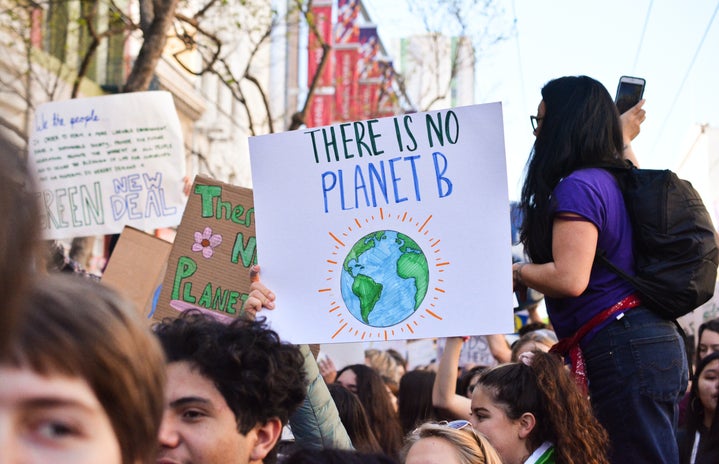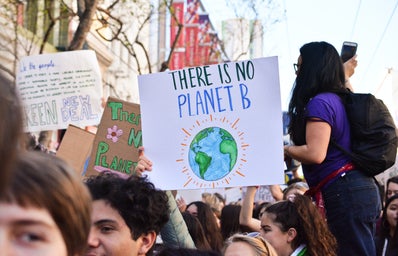It can be absurd to think that it is possible to connect sustainability with gender matter. Yet, as curious as it sounds, it is statistically proven that women, compared to men, are more committed to greener actions in order to cooperate for the planet’s well-being. A socio-political context built an idea of masculinity that understands that some things are simply not for them, stereotyping gender’s actions for no logical reason.
Not a women’s responsibility, everyone’s
For the last couple years, great organizations such as the United Nations (UN), have openly warned about climate change, defending a healthy and sustainable environment as a human right. However, leaders around the globe have mainly not shown commitment, once their political beliefs are mostly based on a lucrative mindset, which leads the population to trying to support their environment by adopting individual actions, such as an ethical lifestyle.
The green products scattered all over market shelves stimulate sustainable consumption, meanwhile, an intensive global interaction in social media has simplified the defense of the environmental movement, pressuring people to minimize daily environmental impacts. Although that information may reach everyone, a Mintel study of 2018, after interviewing 2000 British people, discovered that 71% of women are more ethically concerned, while only 59% of men are.
The activism of women is set in the political scenario, such as in Alexandria Ocasio-Cortez (AOC), a north-american politician who defends progressiveness, for example, or the young Swedish activist Greta Thunberg, who has been all over the world’s media standing up for actual changes since she was a kid. Personalities like them do represent a conscious social development – and the fact that they are young women leaders fighting for the planet’s preservation is not a coincidence.
Still according to the Mintel report, more responsibility in household chores exposes the feminine public to green principles: they tend to care more about water waste, because they are the ones who do the laundry; they recycle more due to the fact that they are taking the trash out. With these circumstances known, eco-friendly campaigns are directed to the female audience. It is necessary to take a look in a historical way to clarify the reasons behind this gender disparity in the eco matter.
Stereotyping effects
In the late 1980s, the Australian sociologist R. W. Connell developed a “hegemonic masculinity” notion in which he recognizes that gender is constructed by culture and social structure. The concept understands the idea of a dominant and idealized male, delegitimizing other versions of being a man.
This perception can be associated with the subject discussed, once a 2016 paper in the Journal of Consumer Research comprehended the greener products connected to a woman’s type of consumption, risking their gender identity maintenance or sexual orientation, fearing to be perceived as gay or an effeminate person.
Implicitly, men tend to disconsider modifying old consumption patterns, exalting stereotypical roles historically created. For instance, in the “Vegan Society and Vegan Life” 2016’s survey, 63% of those who identified themselves as vegans were female and only 37% were male – once there is a perspective that not to consume meat is something associated with being weaker.
The animal activism and protection linked to the fight against climate change is scientifically undeniable and highly recommended by environmentalists and researchers. But, there’s clearly a male reluctance to the veggie diet or a vegan lifestyle. The fear of embracing eco-friendly behaviors and decreasing a certain sense of masculinity can expose an affirmation of a forced idea of virility pressured by the patriarchy, being an offensive way of thinking.
Reverting a misconception
In favor of the environment, it is said that turning the branding more neutral or masculine may influence men not to oppose a certain product. Moreover, researchers have claimed that the natural personality differences between men and women tend to affect the way people see the world and deal with its controversies, including the environmental matter.
In that perspective, characteristics such as socialism and empathy are more common to be a part of a woman’s character. On a daily basis, that would make them feel the need to try helping in some way, meanwhile men keep individualist manners.
Also, according to a 2020’s systematic review, which discusses the gender differences in attitudes to promoting sustainable dietary patterns, it is said that “across Western societies, women are twice as likely as men to be vegan or vegetarian”.
In essence, although an eco-friendly altruism is truly present in the female public, understanding the green project is not limited to a certain gender. Giving enough attention to the recent global environmental alert is a way to revert the misconception that leaves the responsibility to a group that historically have not received the same resources or social power to do so.
The article above was written by Maria Cecília Dallal and edited by Amanda Moraes. Liked this type of content? Check out Her Campus Cásper Líbero home page for more!




